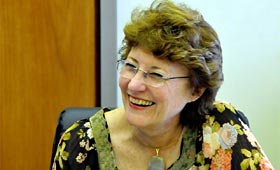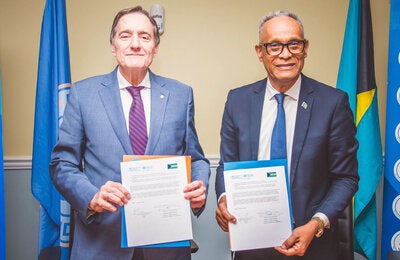

Dr. Mirta Roses is considered by many as the voice of public health in the Americas, but her path to PAHO was not as obvious as one might expect. In fact, she almost did not become a doctor.
Dr. Mirta Roses is considered by many as the voice of public health in the Americas, but her path to PAHO was not as obvious as one might expect. In fact, she almost did not become a doctor.
 Dr. Roses, who is currently serving her second term as PAHO director, gave some insight into her life and career at a session of the annual meeting of the Global Health Council on 15 June, during an informal chat with the council's president and CEO, Jeffrey Sturchio. Speaking about her choices when it came time to pick a specialization as a 16-year-old high school student, she said she faced a major dilemma because "I liked everything," including arts, literature, languages and science. But her best friend was going into medicine so she decided to follow.
Dr. Roses, who is currently serving her second term as PAHO director, gave some insight into her life and career at a session of the annual meeting of the Global Health Council on 15 June, during an informal chat with the council's president and CEO, Jeffrey Sturchio. Speaking about her choices when it came time to pick a specialization as a 16-year-old high school student, she said she faced a major dilemma because "I liked everything," including arts, literature, languages and science. But her best friend was going into medicine so she decided to follow.
She became one of only six women enrolled in the medical school at the National University of Cordoba.
Was it tough? On the one hand, Dr. Roses explained, she and her five female classmates were never short on dinner or dance invitations because they were "such a rare commodity." But on the academic side, "you had to do seven times better than any man. You had to be perfect."
An unexpected but vital skill she picked up along the way was how to win at truco, an Argentine card game generally played by males that allowed her to be accepted in the "brotherhood" of interns while they passed the long hours on night shifts.
Eventually, she specialized in infectious diseases, despite a warning from her father that those would soon be eliminated. Part of her interest may have come from her experience as a child of seeing country people blocking the roads to stop city folk fleeing urban polio outbreaks from spreading the disease. She thought to herself then, "There must be other things to do to block this disease."
Dr. Roses had another epiphany as a young doctor when she wondered if there might be a better way than practicing medicine to really change people's lives. Searching for the answer led her to public health.
She joined PAHO as chief epidemiologist for the Caribbean when then director Carlyle Guerra de Macedo assured her it would only be a two-year commitment. She was initially reluctant because of the impact her frequent travelling would have on her family. Those two years became 27, she recalled, "but I still have the same husband, which is quite an achievement."
As for her current role, it is "like an ambassador without a country to back you, but all pushing you to perform." All the same, she says, "It is a privilege to have this role…I would never change the choice I made in a quite unexpected way."
By Nyka Alexander



